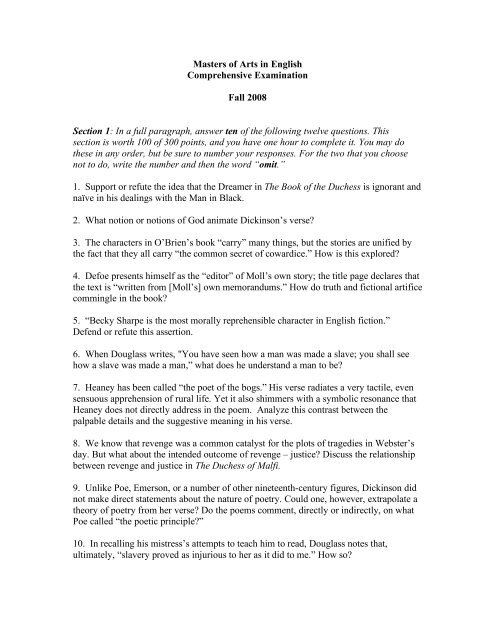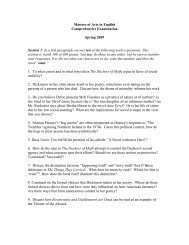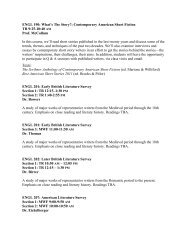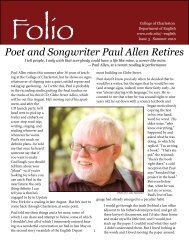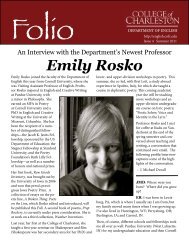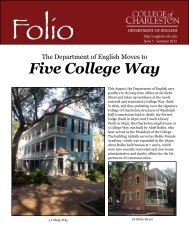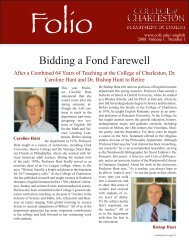Masters of Arts in English Comprehensive Examination Fall 2008 ...
Masters of Arts in English Comprehensive Examination Fall 2008 ...
Masters of Arts in English Comprehensive Examination Fall 2008 ...
You also want an ePaper? Increase the reach of your titles
YUMPU automatically turns print PDFs into web optimized ePapers that Google loves.
<strong>Masters</strong> <strong>of</strong> <strong>Arts</strong> <strong>in</strong> <strong>English</strong><br />
<strong>Comprehensive</strong> Exam<strong>in</strong>ation<br />
<strong>Fall</strong> <strong>2008</strong><br />
Section 1: In a full paragraph, answer ten <strong>of</strong> the follow<strong>in</strong>g twelve questions. This<br />
section is worth 100 <strong>of</strong> 300 po<strong>in</strong>ts, and you have one hour to complete it. You may do<br />
these <strong>in</strong> any order, but be sure to number your responses. For the two that you choose<br />
not to do, write the number and then the word “omit.”<br />
1. Support or refute the idea that the Dreamer <strong>in</strong> The Book <strong>of</strong> the Duchess is ignorant and<br />
naïve <strong>in</strong> his deal<strong>in</strong>gs with the Man <strong>in</strong> Black.<br />
2. What notion or notions <strong>of</strong> God animate Dick<strong>in</strong>son’s verse?<br />
3. The characters <strong>in</strong> O’Brien’s book “carry” many th<strong>in</strong>gs, but the stories are unified by<br />
the fact that they all carry “the common secret <strong>of</strong> cowardice.” How is this explored?<br />
4. Defoe presents himself as the “editor” <strong>of</strong> Moll’s own story; the title page declares that<br />
the text is “written from [Moll’s] own memorandums.” How do truth and fictional artifice<br />
comm<strong>in</strong>gle <strong>in</strong> the book?<br />
5. “Becky Sharpe is the most morally reprehensible character <strong>in</strong> <strong>English</strong> fiction.”<br />
Defend or refute this assertion.<br />
6. When Douglass writes, "You have seen how a man was made a slave; you shall see<br />
how a slave was made a man,” what does he understand a man to be?<br />
7. Heaney has been called “the poet <strong>of</strong> the bogs.” His verse radiates a very tactile, even<br />
sensuous apprehension <strong>of</strong> rural life. Yet it also shimmers with a symbolic resonance that<br />
Heaney does not directly address <strong>in</strong> the poem. Analyze this contrast between the<br />
palpable details and the suggestive mean<strong>in</strong>g <strong>in</strong> his verse.<br />
8. We know that revenge was a common catalyst for the plots <strong>of</strong> tragedies <strong>in</strong> Webster’s<br />
day. But what about the <strong>in</strong>tended outcome <strong>of</strong> revenge – justice? Discuss the relationship<br />
between revenge and justice <strong>in</strong> The Duchess <strong>of</strong> Malfi.<br />
9. Unlike Poe, Emerson, or a number <strong>of</strong> other n<strong>in</strong>eteenth-century figures, Dick<strong>in</strong>son did<br />
not make direct statements about the nature <strong>of</strong> poetry. Could one, however, extrapolate a<br />
theory <strong>of</strong> poetry from her verse? Do the poems comment, directly or <strong>in</strong>directly, on what<br />
Poe called “the poetic pr<strong>in</strong>ciple?”<br />
10. In recall<strong>in</strong>g his mistress’s attempts to teach him to read, Douglass notes that,<br />
ultimately, “slavery proved as <strong>in</strong>jurious to her as it did to me.” How so?
11. Analyze the concept <strong>of</strong> <strong>in</strong>tertextuality <strong>in</strong> Rosencrantz and Guildenstern are Dead.<br />
For example, Shakespeare is an obvious source/context for the play. How is Shakespeare<br />
used? What other texts “appear” <strong>in</strong> the play and how are they used?<br />
12. How do we understand Moll’s character <strong>in</strong> terms <strong>of</strong> the imagery and discourse <strong>of</strong><br />
contracts, commercial transactions, and the law <strong>in</strong> general which pervades the book?<br />
Section 2: This section is worth 200 <strong>of</strong> 300 po<strong>in</strong>ts, and you have two hours to<br />
complete it.<br />
As is typical <strong>of</strong> postmodern and/or absurdist drama, the characters <strong>in</strong> Rosencrantz and<br />
Guildenstern Are Dead seem trapped <strong>in</strong> an <strong>in</strong>scrutable plot that bewilders and frustrates<br />
them at nearly every turn. Alternative avenues are pursued only to be closed <strong>of</strong>f;<br />
cont<strong>in</strong>gency plans are laid then washed away <strong>in</strong> the wake <strong>of</strong> new, unforeseen events. The<br />
characters are thus <strong>of</strong>ten beset by confusion, self-contradiction, and doubt, even as they<br />
struggle mightily to assert the primacy <strong>of</strong> the Self and ga<strong>in</strong> control <strong>of</strong> their dest<strong>in</strong>ies.<br />
Some succeed; others do not, or cannot, depend<strong>in</strong>g on the circumstances.<br />
In several <strong>of</strong> the texts on the read<strong>in</strong>g list, authors exam<strong>in</strong>e this paradox <strong>of</strong> free will <strong>in</strong> a<br />
determ<strong>in</strong>istic world. Us<strong>in</strong>g at least three different works from at least two different<br />
genres, write an essay <strong>in</strong> which you analyze the question <strong>of</strong> to what extent <strong>in</strong>dividuals can<br />
control their lives <strong>in</strong> a clockwork universe. You must choose one work from pre-1800<br />
British literature, one from post-1800 British literature, and one from American literature.<br />
Note: the discussion <strong>of</strong> poets on the list would best be served if more than one poem were<br />
<strong>in</strong>cluded <strong>in</strong> the analysis.


